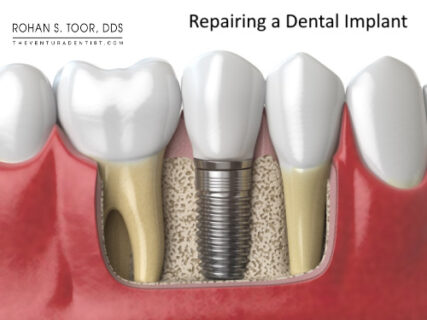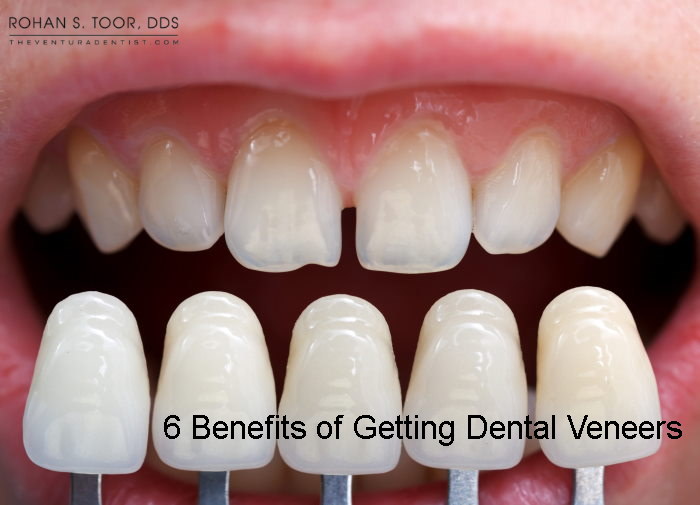
Dental Implant Repair
Dental implant repair is a procedure done when a dental implant failure occurs. Failed dental implants can happen due to faulty implant or placement, peri-implantitis, lack of jawbone mass, nerve or tissue damage, and infection. Nevertheless, your dentist can still repair your failed dental implant by finding the primary cause through x-rays and full digital photos. Once determined, your dentist can choose the best course of treatment.
How Do You Treat a Failed Dental Implant?
Dental implant failure caused by peri-implantitis is frequently treated by sterilizing the implant site and removing infected tissue. For failed dental implants cases caused by insufficient jawbone mass, you will need a bone graft before your dentist can replace the dental implant with a new one. A bone graft can help increase the volume and density of your jawbone in areas where bone loss has happened.
Can a Broken Dental Implant Be Repaired?
Yes, a broken or faulty dental implant can be repaired. An experienced dentist needs to use a specific composite material to do all necessary repairs to fix a chipped dental implant. However, if the severity of the damage is big, it might be required to completely replace teeth with dental implant. Before inserting a new dental implant, you may need to undergo a bone graft to strengthen your bone and make sure there’s sufficient jawbone density. Read about
Dental Implants Healing Time.
Signs of Dental Implant Failure
There are five common symptoms of dental implant failure.
- Severe pain or discomfort
- Chewing or biting difficulties
- Gum recession around the implant
A dentist will diagnose the cause of the implant failure by performing an x-ray. The best treatment for dental implant repair will be determined after identifying the cause.
Causes of Dental Implant Failure
It was found that dental implant surgery has a failure rate of 3.11% according to a retrospective study published in the Journal of Oral Medicine and Oral Surgery. The most common causes of early dental implant failure are surgical trauma, infection, insufficient jawbone mass, sinus problems, and a lack of primary stability. On the other hand, peri-implantitis, occlusal overload, nerve or tissue damage, and failed osseointegration are the common causes of dental implant failure after 10 years.
Failed Implant to Bone Bond
Osseointegration is a process where the dental implant post bonds with your jawbone. Failed osseointegration is often caused by altered treatment plans that prevent initial osseointegration between the implant surface and the surrounding bone. The other common factors that cause failed osseointegration are contamination, improper implant placement, implants made of poor quality materials, trauma during or following surgery, insufficient healing, early loading, and rejection of foreign objects by the body due to allergy.
Insufficient Bone Density
Healthy bone and sufficient bone mass are important factors that affect a dental implant surgery’s success rate. The implant could become loose if there is a lack of jawbone density, which would result in dental implant failure. Your implant dentist will evaluate the state of your bone before the procedure. Bone grafting or a sinus lift procedure may be conducted before the implant placement if there is insufficient bone. Bone grafting is a surgical process that adds bone density with bone from a patient’s own body.
Infection
The most common cause of failed dental implants is an infection at the implant site. A bacterial infection called peri-implantitis is characterized by swelling of the peri-implant mucosa and a progressive loss of the bone that supports the implant. It is brought on by bacterial growth near the dental implant, directly beneath the gum line. The severity and site of infection will determine how it is treated. For instance, medications or soft tissue grafts may be needed to treat a gum infection caused by bacteria. A bone infection caused by bacteria may call for the removal of the implant and any affected bone tissue, followed by a bone and soft tissue graft.
Peri-implantitis Symptoms
Peri-implantitis is an inflammatory condition that can cause a progressive loss of the jawbone where the dental implant is located. Below are the signs of peri-implantitis.
- Pain near the site of the dental implant
- Inflammation of the lymph nodes
- Pus oozing from the implant’s surrounding tissues
- Minor shifting or loosening of your dental implant
- Deeper periodontal pockets around the implant
- Exposure and visibility of the implant threads underneath
Nerve or Tissue Damage
An oral surgeon may occasionally unintentionally place a dental implant too close to a nerve. Your face, tongue, lips, and gums may experience numbness, tingling, or discomfort as a result. You must not ignore this because it may affect your ability to eat and drink normally. Visit your dentist right away if you feel numbness or pain since a nerve or tissue problem needs to be addressed immediately.
Sinus Problems
Acute sinusitis’ inflammatory byproducts have the potential to harm bone graft material’s osteoconduction and bone remodeling as well as the osseointegration of dental implants, ultimately resulting in dental implant failure. Implant failure can also result from perforated sinus. Symptoms of perforated sinus after dental implant include whistling noise when breathing, nasal pressure, breathing difficulties, loss of smell, and bloody discharge. One or two millimeter perforations are workable, but several millimeter perforations frequently lead to chronic issues. Some individuals who had undergone sinus perforation after dental implant experience chronic nasal problems, necessitating the removal of the crown, bone grafting, healing of the site, and another installation of a replacement implant.
Post-op pain after getting dental implants is expected and should subside after 3 to 5 days. However, there are some cases when you may experience persisting or worsening pain for weeks after dental implant surgery. Consult with your oral surgeon or dentist if you’re experiencing pain from dental implants because this could indicate that there is a problem.
How Do You Fix a Broken Dental Implant Crown?
A dental implant crown is artificial tooth that is fixed on a dental implant, giving it the same strength and longevity as a natural tooth. However, eating hard candies, biting your fingernails, and chewing ice can cause an implant crown to chip, crack, or break. Impressions of the mouth will be taken and sent to the dental lab if the crown cracks or breaks. This will be used to create a brand-new crown to replace your previously damaged one.
How Do You Fix a Broken Dental Implant Abutment?
A dental implant abutment is a metal connector attached to your dental implant. The dental implant crown is firmly held in place by the abutment. An abutment may crack as a result of severe wear and tear. In case the abutment is damaged, your dentist will only need to repair it and not the implant as a whole.
What’s the Success Rate for a Dental Implant?
The success rate of implant placement is 90–95% according to the study published in the International Journal of Implant Dentistry. There are four factors that contribute to the success of dental implant surgery. These factors are the dentist’s expertise, good oral and overall health, quality dental implant materials, absence of periodontal diseases and serious medical conditions.
How Can Dental Implant Complications Be Avoided?
Dental implant complications can be avoided if you follow your dentist’s recovery instructions to help healing. You must also keep up with your follow-up appointments so that your dentist can determine if everything is going well with your treatment. Maintaining your regular oral hygiene is a must if you want to avoid complications with your dental implant. Furthermore, you must quit smoking if you are a smoker since smoking will only slow down your recovery.
What more is there to know about dental implants besides repairing?
Dental implants are a popular dental treatment option that involves replacing missing or damaged teeth with artificial teeth that are securely anchored into the jawbone. Rohan S. Toor, DDS has extensive experience in
implant placement. We can help you with any questions related to
dental implant cost without insurance or with it. Give us a call today. Are you considering having a dental implant? To learn more about this restorative dental procedure, consult with Dr. Rohan Toor at
Rohan S. Toor, DDS today.


